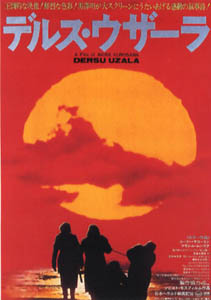Dersu Uzala (1975 film)
| Dersu Uzala (Дерсу Узала) (デルス·ウザーラ) |
|
|---|---|

Original film poster
|
|
| Directed by | Akira Kurosawa |
| Produced by |
Yoichi Matsue Nikolai Sizov |
| Written by |
Vladimir Arsenyev (book) Akira Kurosawa Yuri Nagibin |
| Starring |
Maxim Munzuk Yury Solomin |
| Music by | Isaak Shvarts |
| Cinematography |
Asakazu Nakai Yuri Gantman Fyodor Dobronravov |
| Edited by | Valentina Stepanova |
|
Production
company |
|
| Distributed by | Mosfilm (USSR), Daiei Film (Japan), New World Pictures (USA) |
|
Release date
|
|
|
Running time
|
144 minutes |
| Country | Soviet Union Japan |
| Language | Russian |
| Budget | $4,000,000 (est.) |
Dersu Uzala (Russian: Дерсу Узала, Japanese: デルス·ウザーラ, translit. Derusu Uzāra; alternate U.S. title: Dersu Uzala: The Hunter) is a 1975 Soviet-Japanese co-production film directed by Akira Kurosawa, his first non-Japanese-language film and his first and only 70mm film. The film won the Golden Prize and the Prix FIPRESCI at the 9th Moscow International Film Festival and the 1976 Oscar for Best Foreign Language Film. The film is based on the 1923 memoir Dersu Uzala (which took its name from the native trapper) by Russian explorer Vladimir Arsenyev, about his exploration of the Sikhote-Alin region of the Russian Far East over the course of multiple expeditions in the early 20th century.
The film is almost entirely shot outdoors in the Russian Far East wilderness. The film explores the theme of a native of the forests who is fully integrated into his environment, leading a style of life that will inevitably be destroyed by the advance of civilization. It is also about the growth of respect and deep friendship between two men of profoundly different backgrounds, and about the difficulty of coping with the loss of strength and ability that comes with old age.
The film sold 20.4 million tickets in the Soviet Union and made $1.2 million in the US and Canada.
The film opens to a forest that is being cleared for development, and Arseniev searching for an unmarked grave of a friend he says he buried 3 years ago. The film then flashes back to Arseniev's surveying expedition to the area of Shkotovo in Ussuri region in 1902. A topographic expedition troop, led by Captain Arseniev (Yury Solomin), encounters a nomadic, aboriginal Goldi tribesman named Dersu Uzala (Maxim Munzuk) who agrees to guide them through the harsh frontier. Initially viewed as an uneducated, eccentric old man, Dersu earns the respect of the soldiers through his great intelligence, accurate instincts, keen powers of observation, and deep compassion. He repairs an abandoned hut and leaves provisions in a birch container so that a future traveler would survive in the wilderness. He deduces the identities and situations of people by analyzing tracks and articles left behind.
...
Wikipedia
